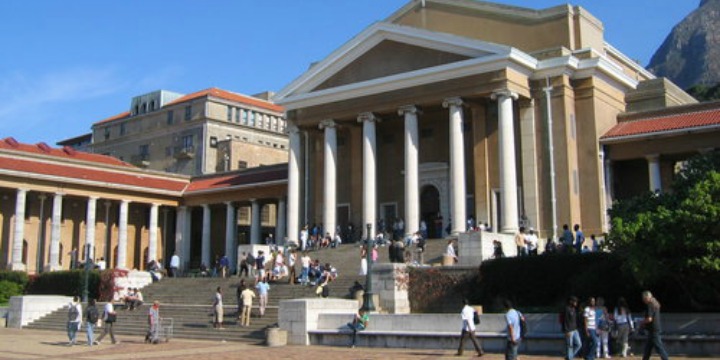Israeli UCT Alumni Speak Out as Campus Leaders Again Set to Consider Academic Boycott
 by Shiri Moshe
by Shiri Moshe
Multiple graduates of the University of Cape Town in South Africa have urged their alma mater to reject an academic boycott of Israel — among them alumni who themselves live in Israel.
The calls come as the UCT Senate is set to debate the boycott on Friday, after the top decision-making body on campus, the Council, referred the proposal back to the Senate in late March, seeking further clarification. It was last endorsed in mid-March by the Senate with a vote of 62 in favor, 43 against, and 10 abstentions, despite strong objections from leading Jewish groups in South Africa.
If endorsed, the measure — advanced by the Palestine Solidarity Forum (PSF) since 2017, as part of its support for the boycott, divestment, and sanctions (BDS) campaign against Israel — would bar UCT from entering into formal relationships with counterparts “operating in the Occupied Palestinian Territories” or, more ambiguously, “enabling gross human rights violations in the Occupied Palestinian Territories.”
In an open letter sent Thursday to Mamokgethi Phakeng, vice chancellor at UCT, alumnus Harris Green pledged to publicly renounce the degree he received from the university in 1968 if it instituted an academic boycott of Israel.
“In such circumstances, I [would] have no wish to preserve my association with an academic institution that denies its students the fundamental rights of academic freedom and free choice,” wrote Green, a resident of Israel who while on campus served as chair of UCT’s branch of the Students Jewish Association, which later became the South African Union of Jewish Students (SAUJS).
“I appeal to you not to allow this racist boycott to be implemented,” he wrote, calling instead for “constructive dialog with Israeli academic institutions.”
“Please don’t allow anarchists to ruin the University’s academic reputation and set it off on an irreversible self-destructing course to academic anonymity.”
In a separate letter to Phakeng, Stephen Schulman — a resident of Ramat Hasharon who received his undergraduate degree from UCT in 1967 — said the motion to boycott Israeli academia “is a blatant act of bigotry, bias, racism and unabashedly pure antisemitism,” and would place UCT in the company of “international pariahs like Iran.”
He pointed to the university’s failure to pass a similar motion against universities in “countries whose record of human rights is abysmal and well-documented,” namely China and Saudi Arabia. “I am deeply ashamed of my alma mater and that it should even consider” this proposal, he wrote.
Bernard Lerer, a 1971 graduate of UCT who now serves as director of the Biological Psychiatry Laboratory at Hebrew University Medical Center, separately told The Algemeiner that the boycott is “based on unfounded accusations against Israel,” and would send “a painful message that speaks of lost opportunities.”
Lerer indicated that the implementation of a boycott would leave him with reservations about recommending others to attend the university, whose international reputation would be adversely impacted.
“The world’s leading universities are not boycotting Israel,” he pointed out.
Sidney Shapiro, a 1967 graduate of UCT who said he was elected to a number of committees while on campus and now lives in Ra’anana, reiterated concerns about the damage UCT’s reputation may sustain by adhering to a boycott that restricts international research collaboration.
“Which respected academic institution would want to maintain contact with a university which practices academic boycott?” he asked
Prospective Jewish students may also shy away in the wake of a boycott, after being warned of the “antagonistic” environment, Shapiro added.
David Kaplan, a resident of Kfar Saba and former chairman of the South African Zionist Federation in Israel (Telfed), shared similar concerns over the proposed boycott, which he indicated were echoed by other alumni in North America, the United Kingdom, and Australia. They “are horrified at the direction and trajectory of their once respected alma mater,” and may not be keen to donate following an academic boycott, he said.
[By] trying to isolate Israel, BDS proponents “may find that UCT will itself find itself internationally isolated,” Kaplan argued.
Representatives for UCT were not immediately available to respond to a request for comment.
 Iran Sentences Rapper Toomaj Salehi to Death Over 2022-23 Unrest
Iran Sentences Rapper Toomaj Salehi to Death Over 2022-23 Unrest Netanyahu: ‘Antisemitic Mobs Have Taken Over Leading U.S. Universities’
Netanyahu: ‘Antisemitic Mobs Have Taken Over Leading U.S. Universities’ U.S. Decides Against Sanctions on IDF’s Netzah Yehuda Battalion
U.S. Decides Against Sanctions on IDF’s Netzah Yehuda Battalion Israel Says It Is Poised to Move on Rafah
Israel Says It Is Poised to Move on Rafah Israeli Hostage Hersh Goldberg-Polin Seen Alive in a New Hamas Video
Israeli Hostage Hersh Goldberg-Polin Seen Alive in a New Hamas Video Palestinian Prime Minister Announces New Reform Package
Palestinian Prime Minister Announces New Reform Package France: Man Suspected of Abducting, Raping Jewish Woman ‘to Avenge Palestine’
France: Man Suspected of Abducting, Raping Jewish Woman ‘to Avenge Palestine’ Israel Intensifies Strikes Across Gaza, Orders New Evacuations in North
Israel Intensifies Strikes Across Gaza, Orders New Evacuations in North Iran Threatens to Annihilate Israel Should It Launch a Major Attack
Iran Threatens to Annihilate Israel Should It Launch a Major Attack ‘Completely Baseless’: Reports of Mass Graves at Gaza Hospitals are False, IDF Says
‘Completely Baseless’: Reports of Mass Graves at Gaza Hospitals are False, IDF Says




 Netanyahu: ‘Antisemitic Mobs Have Taken Over Leading U.S. Universities’
Netanyahu: ‘Antisemitic Mobs Have Taken Over Leading U.S. Universities’ Iran Sentences Rapper Toomaj Salehi to Death Over 2022-23 Unrest
Iran Sentences Rapper Toomaj Salehi to Death Over 2022-23 Unrest Israeli Hostage Hersh Goldberg-Polin Seen Alive in a New Hamas Video
Israeli Hostage Hersh Goldberg-Polin Seen Alive in a New Hamas Video Israel Says It Is Poised to Move on Rafah
Israel Says It Is Poised to Move on Rafah U.S. Decides Against Sanctions on IDF’s Netzah Yehuda Battalion
U.S. Decides Against Sanctions on IDF’s Netzah Yehuda Battalion